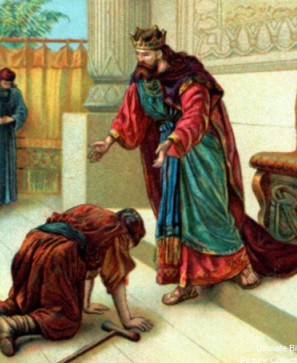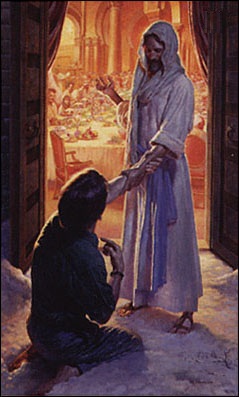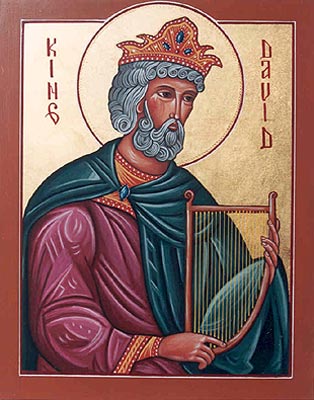Carried to the Table
Today I’d like to share a few thoughts about one of the lesser-known stories about my Biblical namesake, arguably the greatest king in Israel’s history, David.
Hail to the King, baby!
In the eighth chapter of Second Samuel, we are told of David’s great military victories and the tribute brought to him by other kings. David had clearly “made it”: his Kingship was secure, Israel was safe and the Ark of the Covenant had been brought back to Jerusalem where it belonged.
Personally, I would have expected that it would be time for David to put up his feet and enjoy some of the benefits that came from being king. However, what follows in 2 Samuel 9 is something rather different:
“David asked, ‘Is there anyone still left of the house of Saul to whom I can show kindness for Jonathan’s sake?’ …Is there no one still left…to whom I can show God’s kindness?” – 2 Samuel 9:1, 3
What a reaction! Rather than simply indulging himself, David looks to use his wealth and power to bless others!
Background: Biblical Homeboy
To understand the meaning behind David’s question, we must look a little further back in events recorded in the books of 1 & 2 Samuel. The “Jonathan” David referred to above, was son of the “Saul” he mentions, the same Saul who was the former king of Israel (1 Samuel 10:24). Because of Saul’s disobedience, God rejected him as king (1 Samuel 15:23), choosing the shepherd boy, David, to be his successor (1 Samuel 16:13). Despite Saul’s jealousy (1 Samuel 18), Jonathan and David were extremely close friends, even from their first meeting:
“Jonathan became one in spirit with David, and he loved him as himself… And Jonathan made a covenant with David… Jonathan took off the robe he was wearing and gave it to David, along with his tunic, and even his sword, his bow and his belt” – 1 Samuel 18:1-4
When Saul later planned to kill David, it was Jonathan who warned him and helped protect his life (1 Samuel 19:2). Several times David and Jonathan re-affirmed their love for each other through a covenant:
“Then Jonathan said to David ‘…show me unfailing kindness like the LORD’s kindness as long as I live…and do not ever cut off your kindness from my family—not even when the LORD has cut off every one of David’s enemies from the face of the earth'” – 1 Samuel 20:12
David had even been so gracious as to make a similar oath to Saul:
“[Saul]…wept aloud [to David]. ‘You are more righteous than I,’ he said. ‘You have treated me well, but I have treated you badly…May the LORD reward you well for the way you treated me today… Now swear to me by the LORD that you will not kill off my descendants or wipe out my name from my father’s family'”
So David gave his oath to Saul” – 1 Samuel 24:16-22
Then at the start of 2 Samuel David receives the news that Saul and Jonathan have died at the hands of the Philistines in the battle of Mount Gilboa. We read David’s beautiful lament of his friend Jonathan and his enemy Saul:
“Saul and Jonathan – in life they were loved and gracious and in death they were not parted. They were swifter than eagles, they were stronger than lions. O daughters of Israel, weep for Saul, who clothed you in scarlet and finery, who adorned your garments with ornaments of gold. How the mighty have fallen in battle! Jonathan lies slain on your heights. I grieve for you, Jonathan my brother; you were very dear to me. Your love for me was wonderful, more wonderful than that of women.” – 2 Samuel 1:23-26
Whom can I bless?
So, with this as our background, we return to our original passage of Scripture:
“David asked, ‘Is there anyone still left of the house of Saul to whom I can show kindness for Jonathan’s sake?’ …Is there no one still left…to whom I can show God’s kindness?” – 2 Samuel 9:1, 3
Ziba, the servant of Saul’s household, is brought before David and asked who is left of Saul’s family. He replies that there is someone, a man by the name of Mephibosheth (pronounced “meh-FIHB-o-shehth”, meaning “destroyer of the shameful one”). Mephibosheth was the son of Jonathan, the grandson of David’s enemy, Saul. Mephibosheth is lame, and earlier in the book we read that this was as a result of an accident as a child:
“He was five years old when the news about Saul and Jonathan[‘s death] came from Jazreel”. His nurse picked him up and fled, but as she hurried to leave, he fell and became crippled. His name was Mephibosheth” – 2 Samuel 4:4
Ziba tells David that Mephibosheth is living in Lo Debar (literally “Place of no pasture”), far beyond the River Jordan. Mephibosheth was almost certainly trying to keep below the radar of the king, the man whom his grandfather tried to kill.
Entering the courts of the King
David has Mephibosheth brought before him and then begins one of the most beautiful exchanges of the Old Testament:
 When Mephibosheth son of Jonathan, the son of Saul, came to David, he bowed down to pay him honour.
When Mephibosheth son of Jonathan, the son of Saul, came to David, he bowed down to pay him honour.
David said “Mephibosheth!”
“Your servant,” he replied.
“Do not be afraid,” David said to him, “for I will surely show you kindness for the sake of your father Jonathan. I will restore to you all the land that belonged to your grandfather Saul, and you will always eat at my table”
Mephibosheth bowed down and said “What is your servant, that you should notice a dead dog like me?”…
So Mephibosheth ate at David’s table like one of the king’s sons…
And Mephibosheth lived in Jerusalem, because he always ate at the king’s table; he was lame in both feet.
Mephibosheth entered the courts of King David with fear and trepidation, and rightly so. Not only was he standing before God’s “anointed one”, it had always been the perennial practice of kings to kill all the family members of the former king in order to prevent any future claims on the throne. However, what Mephibosheth finds is not wrath, but gentleness…
David does the unthinkable. For the love of Jonathan, he demonstrates “God’s kindness” and blesses the grandson of his enemy, giving him back the land owned by his grandfather. Not only this, but he ignores the “shame” of Mephibosheth’s disability (which is repeatedly emphasized by the text) and invites him to always eat at the King’s table.
The new is hidden in the old…
 Looking back through the lens of Jesus and the New Testament this story is a wonderful allegory of the human condition and the Gospel of Grace.
Looking back through the lens of Jesus and the New Testament this story is a wonderful allegory of the human condition and the Gospel of Grace.
Mephibosheth fears for his life because of the rebellion of his forefather Saul. We too, suffer the consequences of Adam’s sin and, like Adam, try to hide from the King. Mephibosheth’s physical disability depicts our spiritual condition due to our estrangement from God.
David calls Mephibosheth from the “place of no pasture”, through the Jordan River into the King’s courts. Likewise, it is the King of Heaven who calls us to Himself, from a spiritual wasteland through the waters of baptism into His loving presence where we find not wrath, but grace.
For the love of Jonathan, Mephibosheth is restored and welcomed to the King’s table. For love of Christ, we too are welcomed and restored. We bring nothing of worth, nothing with which to impress the King except the admission of our unworthiness, yet still we are invited to to commune with royalty at the Table of the Lord in the Eucharist.
“Grace isn’t picky… Grace doesn’t look for things that have been done that deserve love. Grace operates apart from the response or the ability of the individual. Grace is one-sided, it is God giving Himself in full acceptance to someone who does not deserve it, can never earn it and will never be able to repay”
– Pastor Chuck Swindoll
These things were written for our instruction…
When I look back on this story I find the allegorical reading of this passage, which so clearly demonstrates God’s grace, simply beautiful. Spending time with this passage renews my awe for God’s graciousness and my wonder at my own, undeserved, blessing. By rights I deserve nothing, but by His goodness I am welcomed as a son.
However, when I consider the moral sense of this passage I start to get uncomfortable. What does this passage teach me about right living?
David overcame the social stigma of Mephibosheth’s disability and welcomed him to the royal table. How his subjects must have gossiped! A cripple at the king’s table?! How many times have I judged by appearances and allowed my perceived imperfection in someone else to keep me from welcoming that person as the Lord (especially at church)?
David also teaches me a more demanding level of service of others. It is more demanding because it is driven by love, rather than duty. If I consider myself to be in covenant with Jesus, then should I not seek to bless those He also loves? Should I not be looking for those people who, through faith, have become His adopted brothers and sisters, children of the same Father? Do I have such a deep love for Christ that I actually go searching for people to bless? This reminds me of a passage from “The Didache”, a Christian manual from about AD 50:
“Let your alms sweat in your hands, until you know to whom you should give”
– The Didache, Chapter 1
Do I hold gifts in my hands for others? Do they sweat until I have found someone with whom to bless them? Do I seek to repay others as I think they deserve, or do I seek to bless for the love of Christ and to show them “God’s kindness”?

You’re getting the hang of this, aren’t you!
Pax et bonum.
Wow – I’m officially treating the above comment as my very own “nihil obstat”.
You’ll also be pleased to hear that I’ve got a post in draft commenting on your post about the Sign of Peace
to hear that I’ve got a post in draft commenting on your post about the Sign of Peace 
I’m no authority, but this is a beautiful entry that really spoke to me! Thanks for all your blogging!
Pingback: Against the Wind » Blog Archive » Psalm 21